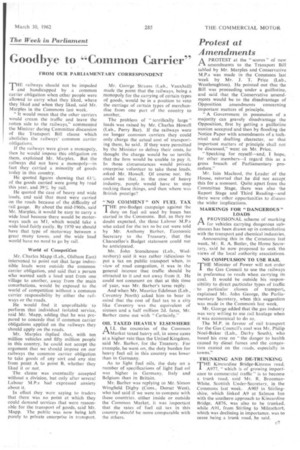Protest at Amendments
Page 47

If you've noticed an error in this article please click here to report it so we can fix it.
1-1 A PROTEST at the " scores of new amendments to the Transport Bill tabled by Mr. Marples and Conservative M.P.s was made in the Commons last week by Mr. J. T. Price (Lab., Westhoughton). He pointed out that the Bill was proceeding under a guillotine, and said that the Conservative amendments would be to the disadvantage of Opposition amendments concerning important matters of principle.
" A Government in possession of a majority can gravely disadvantage the Opposition, first by getting a guillotine motion accepted and then by flooding the Notice Paper with amendments of a technical and drafting character, so that important matters of principle shall not be discussed," went on Mr. Price.
"Speaking for myself—and, I hope, for other members—I regard this as a gross breach of Parliamentary procedure."
Mr. lain Macleod, the Leader of the House, retorted that he did not accept this for a moment. Quite apart from the Committee Stage, there was also the Report Stage and Third Reading—and there were other opportunities to discuss the wider implications.
MARKINGS FOR "DANGEROUS" LOADS
A PROVISIONAL scheme of marking PA for vehicles carrying dangerous substances has been drawn up in consultation with the transport and chemical industries. Announcing this in the Commons last week, Mr. R. A. Butler, the Home Secretary, said he now proposed to seek the views of the local authority associations.
NO COMPULSION TO USE RAIL
THE Minister of Power will not order the Gas Council to use the railways in preference to roads when carrying its coal. It would be outside his responsibility to direct particular types of traffic to particular classes of transport, explained Mr. John George. the Parliamentary Secretary, when this suggestion was made in the Common's last week.
Mr. George added that the gas industry was very willing to use rail haulage when it was economical to do so.
The M.P. in favour of rail transport for the Gas Council's coal was Mr. Philip Noel-Baker (Lab., Derby South), who based his case on "the danger to health caused by diesel fumes and the congestion caused on the roads, especially in towns."
TRUNKING AND DE-TRUNKING THE Kincardine Bridge-Kinross road. I A977, which is of growing importance to commercial traffic" is to become a trunk road, said Mr. R. BroomanWhite, Scottish Under-Secretary, in the Commons last week. A905 in Stirlingshire, which linked A9 at Salmon Inn with the southern approach to Kincardine Bridge, A876, was also to be trunked, while A91, from Stirling to Milnathort, which was declining in importance. was to cease being a trunk road, he said.
































































































































